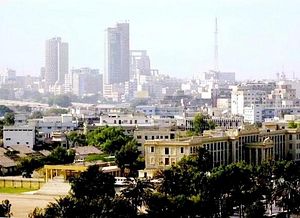For a long time, Karachi, Pakistan’s economic hub, has seen ruthless and extraordinary levels of violence. Terrorism, corruption, ethnic conflicts, gang wars, and bitter disputes for the control of resources continue to define the city’s life.
Over the last three decades, a continuous wave of migrations from different part of the country and Afghanistan have led to a gathering of all sorts of militant groups in the city. Besides local terrorist organizations, different foreign militant networks such as the Islamic Movement of Uzbekistan and al-Qaida have established their presence in the city.
Karachi has also remained trapped in the carnage stemming from ethnic conflicts. Uncontrolled migration has further complicated the ethnic mix of the city. According to some reports, between 2000 and 2010, Karachi’s population increased about 80 percent, the largest increase for any city in the world at that time.
Ethno-political violence has resulted in the deaths of thousands. The violent competition between the Muhajirs (people who migrated from India during the partition of the Indian subcontinent) and Pashtuns (mostly from Khyber Pakhtunkhwa) to enhance and safeguard their political and economic interests has further aggravated the city’s militant landscape, with each group operating its own militias. These ethnic divisions have virtually divided the city into different ethnic sectors, with each having de facto control of its areas.
Further complicating the problem is the federal government’s and the military’s relationship with these groups. Over the decades, the country’s main political parties and the military have used these groups to pursue their larger political and security agendas. As a consequence, this has given more maneuvering space to these groups against each other, putting the city under siege.
At times, the country’s security agencies have attempted to control Karachi through these groups by using their political representation in the city. To pursue these ends, the military and different ethnic groups based in the city — particularly the Muhajirs — have, on different occasions, attempted to appease each other by volunteering to support each other’s agendas and interests.
Moreover, the military’s “on” and “off” approach to containing the rising violence in the city by eradicating groups of their militant wings have further inflamed local tensions. For instance, the Muhajir Qaumi Movement (MQM), a political party representing Muhajir interests that is currently facing the heat of the military’s counter terrorism operation in Karachi, has in the past remained allied with the Army directly and indirectly.
While the military, on different occasions, has labeled the MQM as an anti-state party to reduce its support base in the city, the party, whenever it found itself embattled with the state, has reached out to its electorate for support by describing its treatment as the segregation and persecution of the entire Muhajir community.
The military’s counter terrorism operations to purge the city of violence have resulted in the deaths and arrests of hundreds and thousands of party workers. In the early 1990s, the Army’s military operation to cleanse the city of militant gangs, code named “Operation Cleanup,” didn’t result in lasting peace. The operation, however, further reinforced different ethnic allegiances to their groups, particularly the MQM. In a similar vein, the current military operation in Karachi is not likely to break the city’s terror networks as it has again provoked a reaction of victimization by several ethic groups.
Moreover, kidnappings and targeted killings in the city have surged again, just a few weeks after the military’s claims that Karachi’s security situation had improved significantly due to the recent counterterrorism operations in the city. About two weeks ago, thousands of mourners flooded Karachi’s streets to pay tribute to Amjad Sabri, a famous Sufi singer who was murdered by the Pakistani Taliban. On June 21, the son of the provincial high court’s chief justice was abducted from the city while a doctor belonging to the Ahmadiyya Muslim community was killed also a few days ago. Sabri’s death in Karachi was claimed by the Taliban while the killing of an Ahmadi doctor was seen as an act of sectarian violence. Moreover, according to a recently released report, about 75 percent of militants on a terror watchlist for their alleged affiliations with more than a dozen militant organizations remain untraceable in Karachi.
These incidents point towards the city’s complex militant landscape, where terrorists belonging to different backgrounds continue to retain the capacity to cripple Karachi’s life even after the military’s use of brute force for more than two years.

































